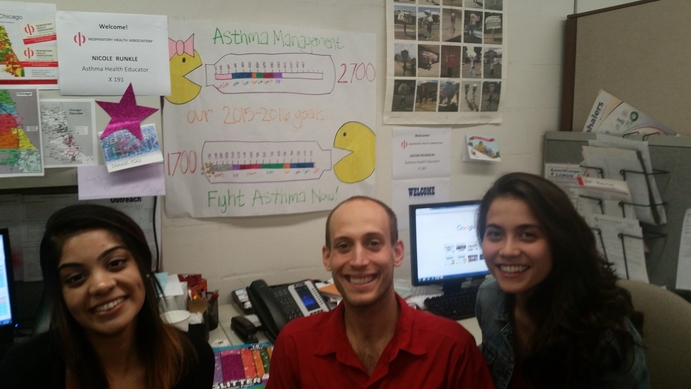Important Skills Gained From Our Service Term

As the service term comes to a close and the next chapters of our lives begin, Jake, Ashley and I reflect upon theskills we have cultivated during our service as Asthma Educators at the Respiratory Health Association (RHA) that we will take with us into our future careers. Of course, we joined the National Health Corps because of our passion for service, looking to help Chicago communities while gaining a better understanding of public health issues. And while we have accomplished so much through our experiences, we found that we have picked up a few other skills along the way to take with us into our professional careers.
In the fall, Jake and Ashley will be headed off to earn their Masters in Public Health. Through serving at RHA, they both havehad the opportunity to be surrounded by public health professionals in a formal setting. For Jake, he especially appreciated that his knowledge and exposure to the field of public health has greatly increased as he observed the work of the staff here who are experts in the field. For example, through conversations with the Director of Environmental Health, Jake has a better understanding of the environment's impact on health and of policies that are at the forefront to address this issue. Directly interacting with someone who is incredibly knowledgeable, passionate, and respected in the field has made Jake more appreciative of this public health issue.
Serving in a setting like RHA has not only exposed Jake and Ashley to more public health knowledge, but also increased theirabilities to interact with others in the professional world and the community. In addition to working with the staff at RHA, the role of an Asthma Educator is to reach out to individuals in the community and present the information necessary for asthma management. Ashley excelled at this, in particular. In order for the asthma programs to have a wide impact, Ashley needed to speak with many individuals and stakeholders for this chronic disease to promote the importance of asthma education. Whether this was speaking to school nurses, case managers, administration or parents, she learned how to navigate the conversation and explain how each played a role in managing asthma. The skills to outreach, network,and present the significance of an issue are invaluable in the field of public health.
As for myself, I will be taking the skills I have learned this year into medical school and my career as a physician. On a more basic level, I now know a lot more about asthma medications, treatments, and its impact on urban communities than I did last August. On top of that, through my interactions with students and caregivers, I also have a greater understanding of the challenges individuals and families face when managing a chronic disease. During Asthma Management presentations delivered to adults, the staff and parents often would bring up personal stories and frustrations about asthma care. I have learned to listen to their stories and navigate the conversations so they can walk away from the presentation with an idea of how to integrate the information into their specific asthma care. This is something that I will continue to build upon in my medical career - rather than just simply writing a prescription for a patient, I will work to help the patient understand and build the medication and behavioral modifications into the context of their life.
Additionally, my confidence in my presentation skills has definitely improved, but I think more importantly, so has my understanding of the importance of delivering a message that the audience will understand. In RHA programs meetings, we often discuss the audience we are addressing and how we can present the material in a way that is informative, yet engaging and understandable. One method I have learned is how to assess the readability level of educational materials. Often times health professionals get caught up in all the medical jargon and terminology that they may forget the patients they are dealing with don't have the same exposure and extensive medical education that they have had. This is a useful tool that I have learned that will help me check the resources I hand out to patients, and help serve as a reminder for how I have conversations with patients.
The three of us may or may notchoose to specialize in asthma in our future careers, but we have walked away with invaluable skills that we can take with us into our fields. Our service term at RHA has given us the opportunity to take what we've learned and shape it to fit our career interests. For anyone who is passionate about service, but is unsure of how the National Health Corps fits into their future career path, I hope this helps to shed light on some of the things you can learn. Ultimately, this experience is what you make of it. There is a plethora of opportunities and lessons to be learned - you just have to give it a shot!

This blog post was written by NHC Chicago member Nicole Runkle.
Nicole serves as an Asthma Educator at Respiratory Health Association.